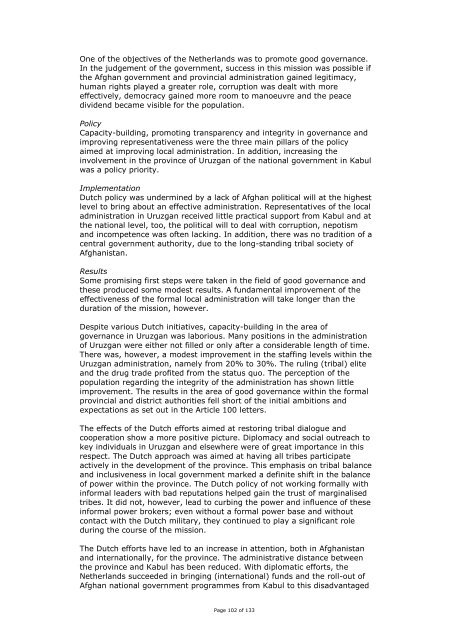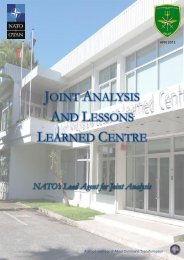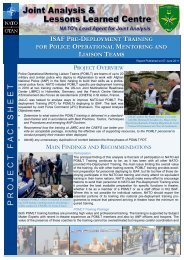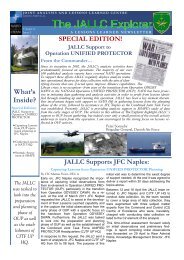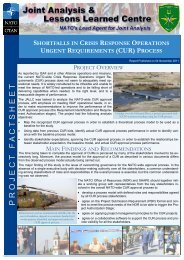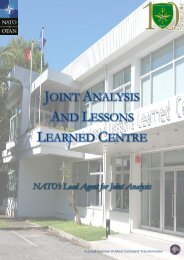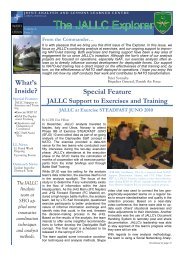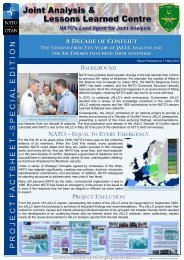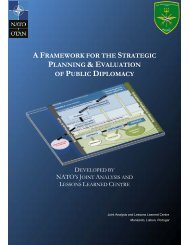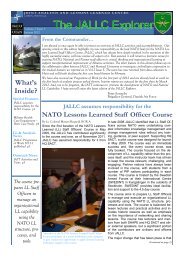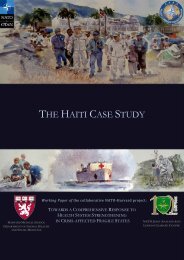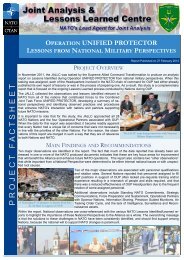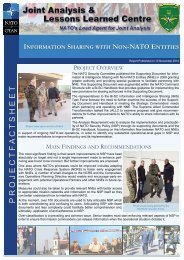Final evaluation Netherlands participation in ISAF 2006 - 2010
Final evaluation Netherlands participation in ISAF 2006 - 2010
Final evaluation Netherlands participation in ISAF 2006 - 2010
Create successful ePaper yourself
Turn your PDF publications into a flip-book with our unique Google optimized e-Paper software.
One of the objectives of the <strong>Netherlands</strong> was to promote good governance.In the judgement of the government, success <strong>in</strong> this mission was possible ifthe Afghan government and prov<strong>in</strong>cial adm<strong>in</strong>istration ga<strong>in</strong>ed legitimacy,human rights played a greater role, corruption was dealt with moreeffectively, democracy ga<strong>in</strong>ed more room to manoeuvre and the peacedividend became visible for the population.PolicyCapacity-build<strong>in</strong>g, promot<strong>in</strong>g transparency and <strong>in</strong>tegrity <strong>in</strong> governance andimprov<strong>in</strong>g representativeness were the three ma<strong>in</strong> pillars of the policyaimed at improv<strong>in</strong>g local adm<strong>in</strong>istration. In addition, <strong>in</strong>creas<strong>in</strong>g the<strong>in</strong>volvement <strong>in</strong> the prov<strong>in</strong>ce of Uruzgan of the national government <strong>in</strong> Kabulwas a policy priority.ImplementationDutch policy was underm<strong>in</strong>ed by a lack of Afghan political will at the highestlevel to br<strong>in</strong>g about an effective adm<strong>in</strong>istration. Representatives of the localadm<strong>in</strong>istration <strong>in</strong> Uruzgan received little practical support from Kabul and atthe national level, too, the political will to deal with corruption, nepotismand <strong>in</strong>competence was often lack<strong>in</strong>g. In addition, there was no tradition of acentral government authority, due to the long-stand<strong>in</strong>g tribal society ofAfghanistan.ResultsSome promis<strong>in</strong>g first steps were taken <strong>in</strong> the field of good governance andthese produced some modest results. A fundamental improvement of theeffectiveness of the formal local adm<strong>in</strong>istration will take longer than theduration of the mission, however.Despite various Dutch <strong>in</strong>itiatives, capacity-build<strong>in</strong>g <strong>in</strong> the area ofgovernance <strong>in</strong> Uruzgan was laborious. Many positions <strong>in</strong> the adm<strong>in</strong>istrationof Uruzgan were either not filled or only after a considerable length of time.There was, however, a modest improvement <strong>in</strong> the staff<strong>in</strong>g levels with<strong>in</strong> theUruzgan adm<strong>in</strong>istration, namely from 20% to 30%. The rul<strong>in</strong>g (tribal) eliteand the drug trade profited from the status quo. The perception of thepopulation regard<strong>in</strong>g the <strong>in</strong>tegrity of the adm<strong>in</strong>istration has shown littleimprovement. The results <strong>in</strong> the area of good governance with<strong>in</strong> the formalprov<strong>in</strong>cial and district authorities fell short of the <strong>in</strong>itial ambitions andexpectations as set out <strong>in</strong> the Article 100 letters.The effects of the Dutch efforts aimed at restor<strong>in</strong>g tribal dialogue andcooperation show a more positive picture. Diplomacy and social outreach tokey <strong>in</strong>dividuals <strong>in</strong> Uruzgan and elsewhere were of great importance <strong>in</strong> thisrespect. The Dutch approach was aimed at hav<strong>in</strong>g all tribes participateactively <strong>in</strong> the development of the prov<strong>in</strong>ce. This emphasis on tribal balanceand <strong>in</strong>clusiveness <strong>in</strong> local government marked a def<strong>in</strong>ite shift <strong>in</strong> the balanceof power with<strong>in</strong> the prov<strong>in</strong>ce. The Dutch policy of not work<strong>in</strong>g formally with<strong>in</strong>formal leaders with bad reputations helped ga<strong>in</strong> the trust of marg<strong>in</strong>alisedtribes. It did not, however, lead to curb<strong>in</strong>g the power and <strong>in</strong>fluence of these<strong>in</strong>formal power brokers; even without a formal power base and withoutcontact with the Dutch military, they cont<strong>in</strong>ued to play a significant roledur<strong>in</strong>g the course of the mission.The Dutch efforts have led to an <strong>in</strong>crease <strong>in</strong> attention, both <strong>in</strong> Afghanistanand <strong>in</strong>ternationally, for the prov<strong>in</strong>ce. The adm<strong>in</strong>istrative distance betweenthe prov<strong>in</strong>ce and Kabul has been reduced. With diplomatic efforts, the<strong>Netherlands</strong> succeeded <strong>in</strong> br<strong>in</strong>g<strong>in</strong>g (<strong>in</strong>ternational) funds and the roll-out ofAfghan national government programmes from Kabul to this disadvantagedPage 102 of 133


